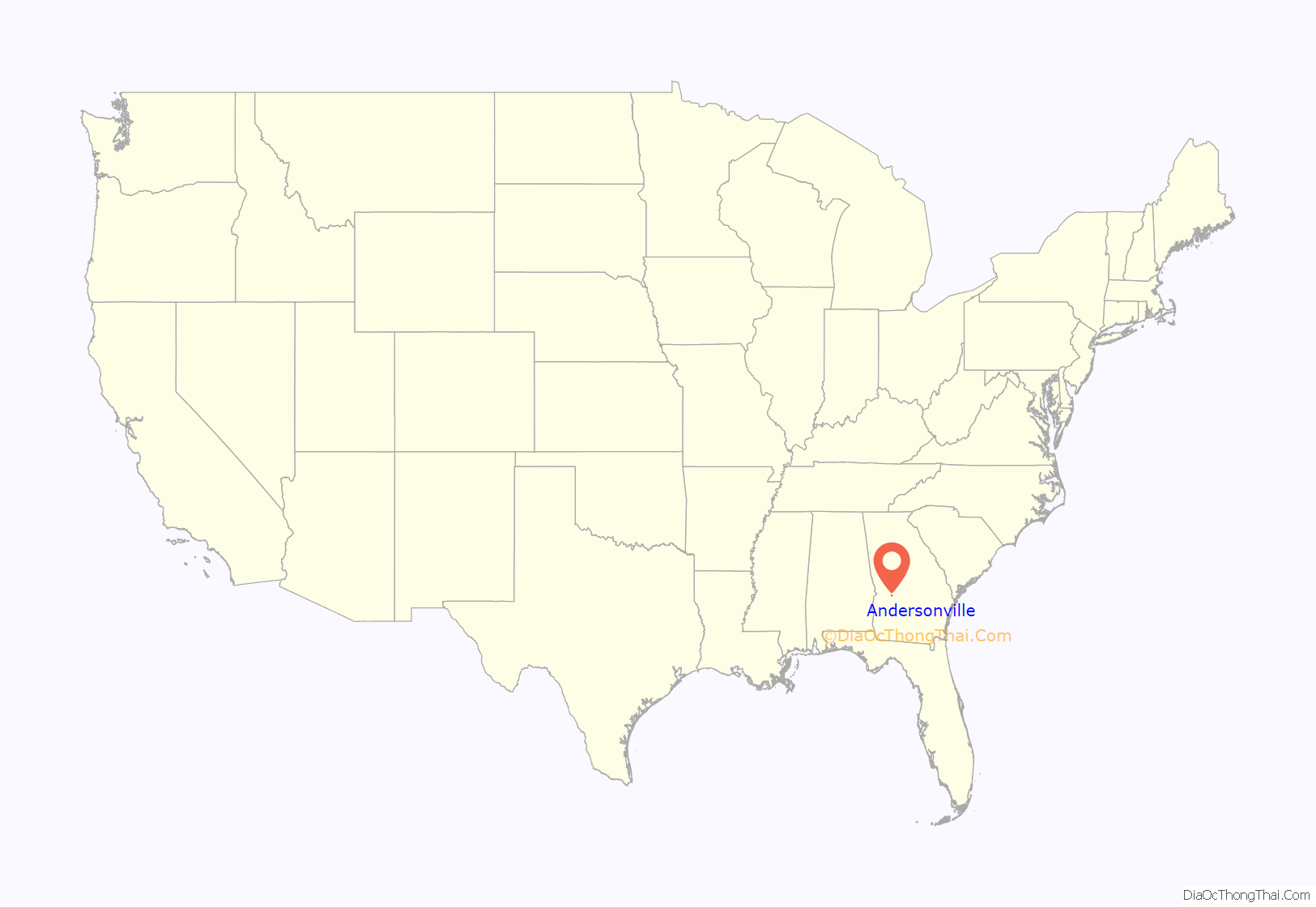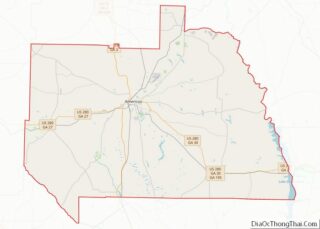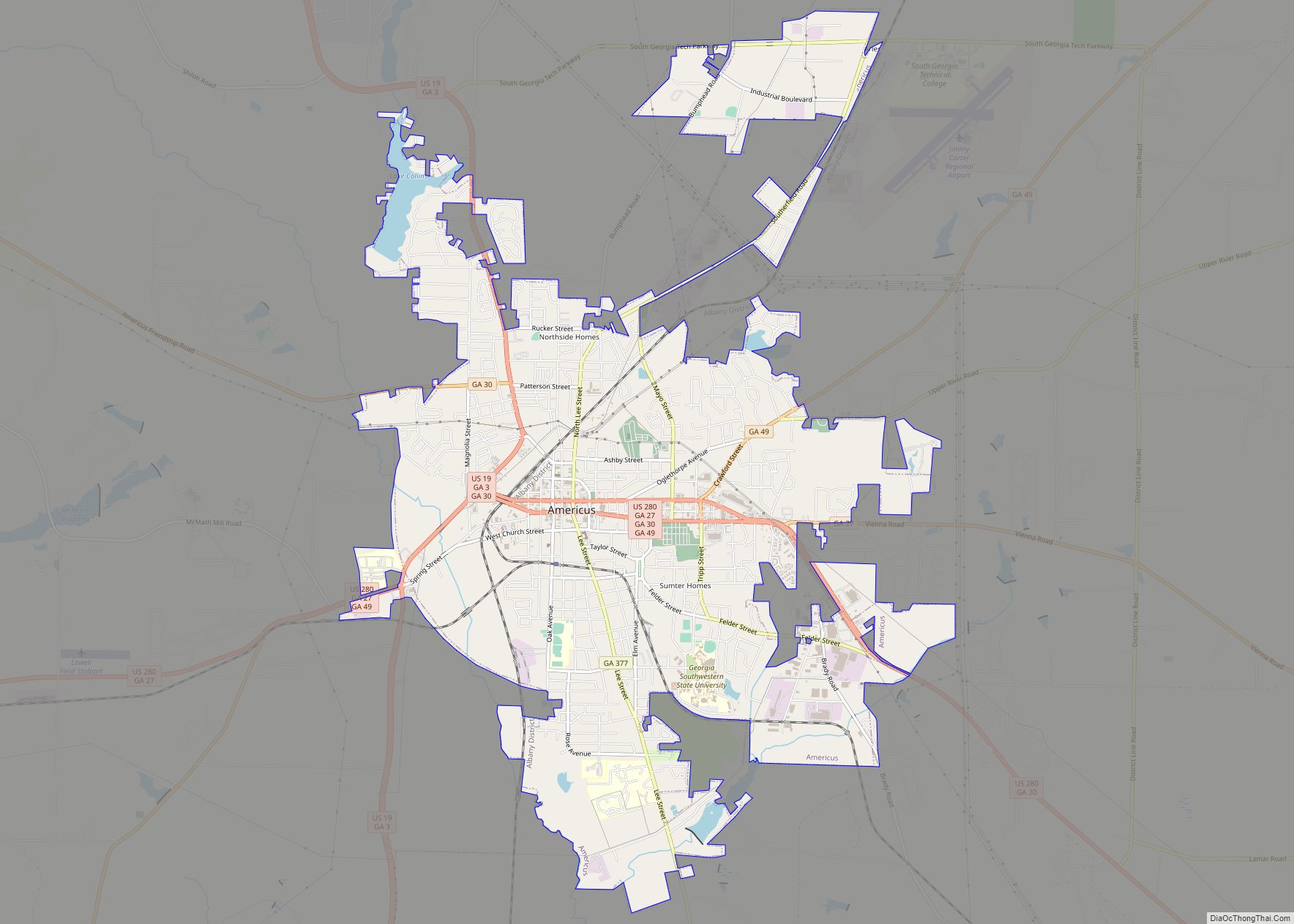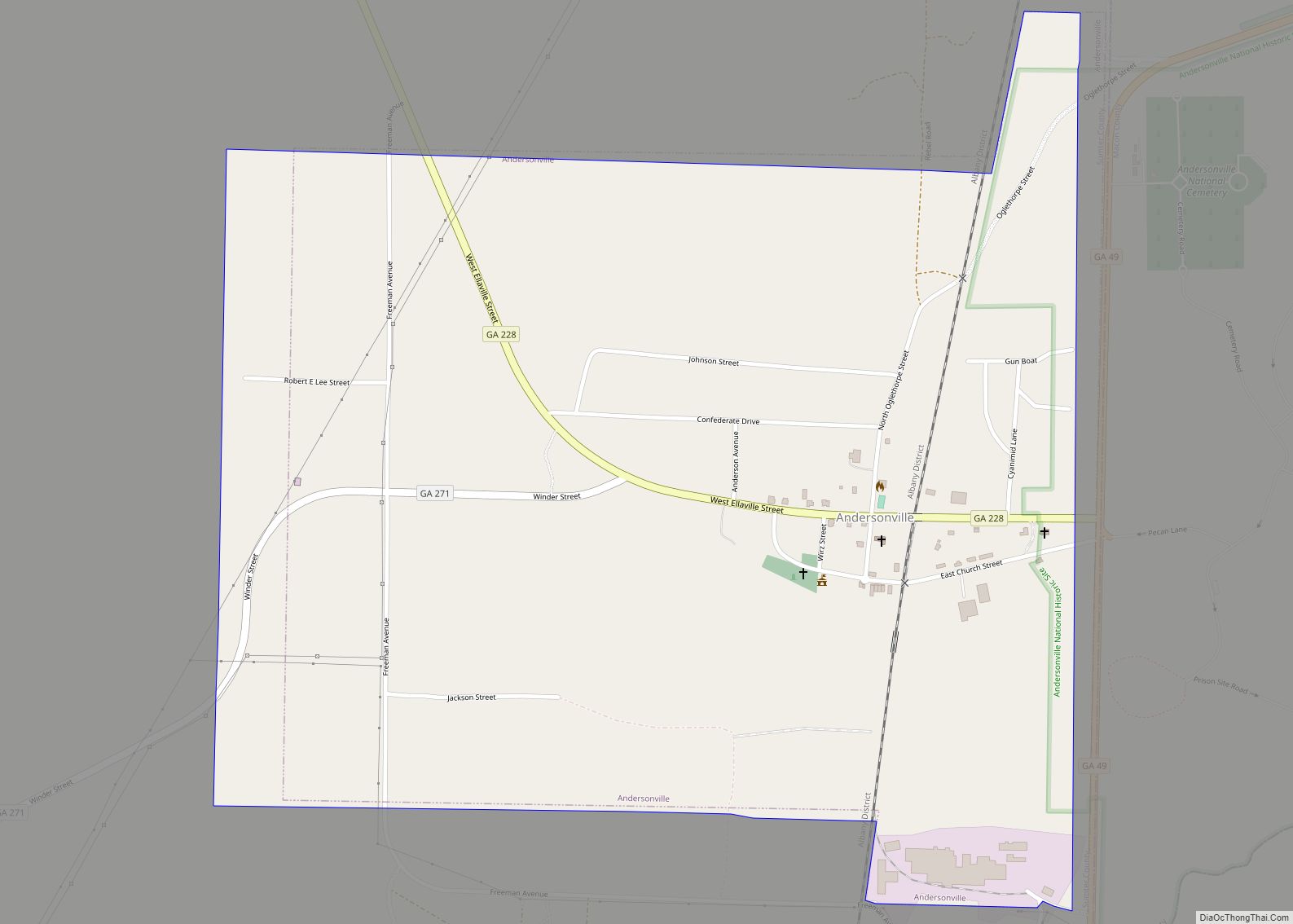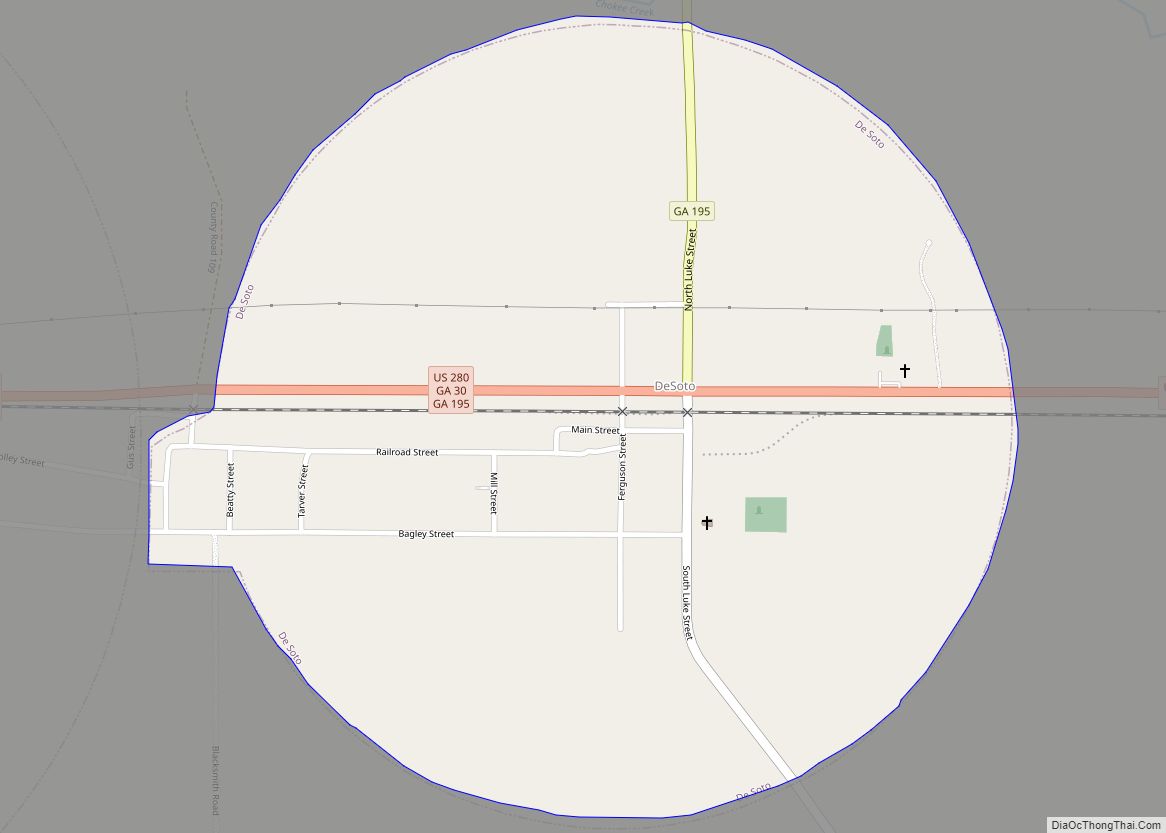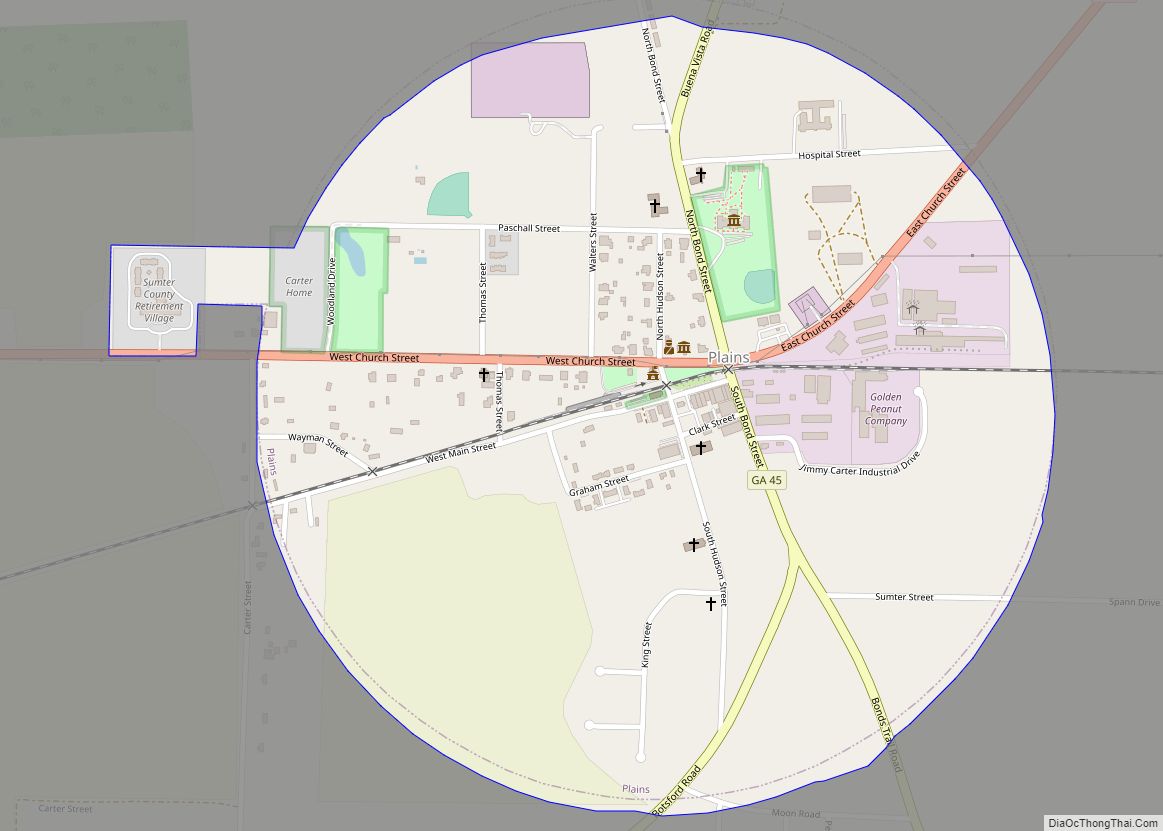Andersonville is a city in Sumter County, Georgia, United States. As of the 2020 census, the city had a population of 237. It is located in the southwest part of the state, approximately 60 miles (97 km) southwest of Macon on the Central of Georgia railroad. During the American Civil War, it was the site of a prisoner-of-war camp, which is now Andersonville National Historic Site.
Andersonville is part of the Americus Micropolitan Statistical Area.
| Name: | Andersonville city |
|---|---|
| LSAD Code: | 25 |
| LSAD Description: | city (suffix) |
| State: | Georgia |
| County: | Sumter County |
| Elevation: | 397 ft (121 m) |
| Total Area: | 1.39 sq mi (3.59 km²) |
| Land Area: | 1.38 sq mi (3.57 km²) |
| Water Area: | 0.01 sq mi (0.02 km²) |
| Total Population: | 237 |
| Population Density: | 171.74/sq mi (66.33/km²) |
| ZIP code: | 31711 |
| Area code: | 229 |
| FIPS code: | 1302256 |
| GNISfeature ID: | 0354310 |
| Website: | andersonvillegeorgia.info |
Online Interactive Map
Click on ![]() to view map in "full screen" mode.
to view map in "full screen" mode.
Andersonville location map. Where is Andersonville city?
History
The hamlet of Anderson was named for John Anderson, a director of the South Western Railroad in 1853 when it was extended from Oglethorpe to Americus. It was known as Anderson Station until the US post office was established in November 1855. The government changed the name of the station from “Anderson” to “Andersonville” in order to avoid confusion with the post office in Anderson, South Carolina.
During the Civil War, the Confederate army established Camp Sumter at Andersonville to house incoming Union prisoners of war. The overcrowded Andersonville Prison was notorious for its bad conditions, and nearly 13,000 prisoners died there. After the war, Henry Wirz was convicted for war crimes related to the command of the camp. His trial was later regarded as unfair by several groups, and a monument in his honor has been erected in Andersonville by the United Daughters of the Confederacy.
The town also served as a supply depot during the war period. It included a post office, a depot, a blacksmith shop and stable, a couple of general stores, two saloons, a school, a Methodist church, and about a dozen houses. Ben Dykes, who owned the land on which the prison was built, was both depot agent and postmaster.
Until the establishment of the prison, the area was entirely dependent on agriculture, supported by dark reddish brown sandy loams later mapped as Greenville and Red Bay soil series. After the close of the prison and end of the war, the town continued economically dependent on agriculture, primarily the cultivation of cotton as a commodity crop.
It was not until 1968, when the large-scale mining of kaolin, bauxitic kaolin, and bauxite was begun by Mulcoa, Mullite Company of America, that the town was dramatically altered. This operation exploited 2,000 acres (8.1 km) of scrub oak wilderness into a massive mining and refining operation. The company now ships more than 2000 tons of refined ore from Andersonville each week.
In 1974, long-time mayor Lewis Easterlin and a group of concerned citizens decided to promote tourism in the town, redeveloping Main Street to look much as it did during the American Civil War. The city of Andersonville and the Andersonville National Historic Site, location of the prison camp, are now tourist attractions.
Andersonville Road Map
Andersonville city Satellite Map
Geography
Climate
See also
Map of Georgia State and its subdivision:- Appling
- Atkinson
- Bacon
- Baker
- Baldwin
- Banks
- Barrow
- Bartow
- Ben Hill
- Berrien
- Bibb
- Bleckley
- Brantley
- Brooks
- Bryan
- Bulloch
- Burke
- Butts
- Calhoun
- Camden
- Candler
- Carroll
- Catoosa
- Charlton
- Chatham
- Chattahoochee
- Chattooga
- Cherokee
- Clarke
- Clay
- Clayton
- Clinch
- Cobb
- Coffee
- Colquitt
- Columbia
- Cook
- Coweta
- Crawford
- Crisp
- Dade
- Dawson
- Decatur
- DeKalb
- Dodge
- Dooly
- Dougherty
- Douglas
- Early
- Echols
- Effingham
- Elbert
- Emanuel
- Evans
- Fannin
- Fayette
- Floyd
- Forsyth
- Franklin
- Fulton
- Gilmer
- Glascock
- Glynn
- Gordon
- Grady
- Greene
- Gwinnett
- Habersham
- Hall
- Hancock
- Haralson
- Harris
- Hart
- Heard
- Henry
- Houston
- Irwin
- Jackson
- Jasper
- Jeff Davis
- Jefferson
- Jenkins
- Johnson
- Jones
- Lamar
- Lanier
- Laurens
- Lee
- Liberty
- Lincoln
- Long
- Lowndes
- Lumpkin
- Macon
- Madison
- Marion
- McDuffie
- McIntosh
- Meriwether
- Miller
- Mitchell
- Monroe
- Montgomery
- Morgan
- Murray
- Muscogee
- Newton
- Oconee
- Oglethorpe
- Paulding
- Peach
- Pickens
- Pierce
- Pike
- Polk
- Pulaski
- Putnam
- Quitman
- Rabun
- Randolph
- Richmond
- Rockdale
- Schley
- Screven
- Seminole
- Spalding
- Stephens
- Stewart
- Sumter
- Talbot
- Taliaferro
- Tattnall
- Taylor
- Telfair
- Terrell
- Thomas
- Tift
- Toombs
- Towns
- Treutlen
- Troup
- Turner
- Twiggs
- Union
- Upson
- Walker
- Walton
- Ware
- Warren
- Washington
- Wayne
- Webster
- Wheeler
- White
- Whitfield
- Wilcox
- Wilkes
- Wilkinson
- Worth
- Alabama
- Alaska
- Arizona
- Arkansas
- California
- Colorado
- Connecticut
- Delaware
- District of Columbia
- Florida
- Georgia
- Hawaii
- Idaho
- Illinois
- Indiana
- Iowa
- Kansas
- Kentucky
- Louisiana
- Maine
- Maryland
- Massachusetts
- Michigan
- Minnesota
- Mississippi
- Missouri
- Montana
- Nebraska
- Nevada
- New Hampshire
- New Jersey
- New Mexico
- New York
- North Carolina
- North Dakota
- Ohio
- Oklahoma
- Oregon
- Pennsylvania
- Rhode Island
- South Carolina
- South Dakota
- Tennessee
- Texas
- Utah
- Vermont
- Virginia
- Washington
- West Virginia
- Wisconsin
- Wyoming
